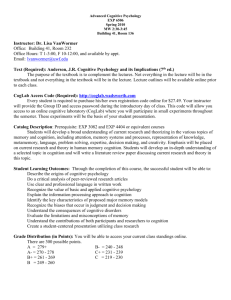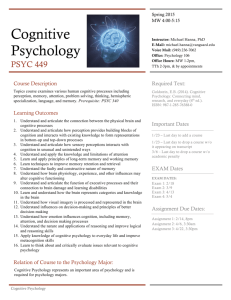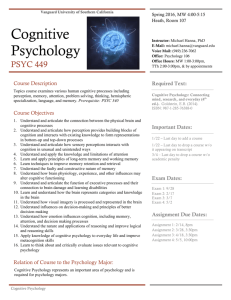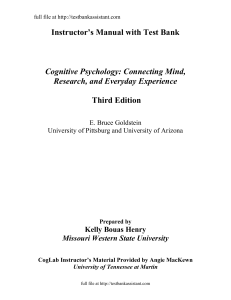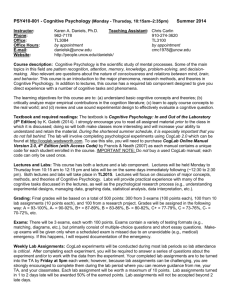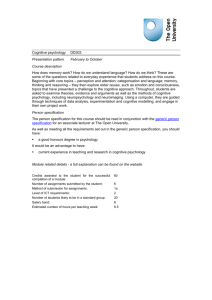Cognitive Psychology - Vanguard University of Southern California
advertisement
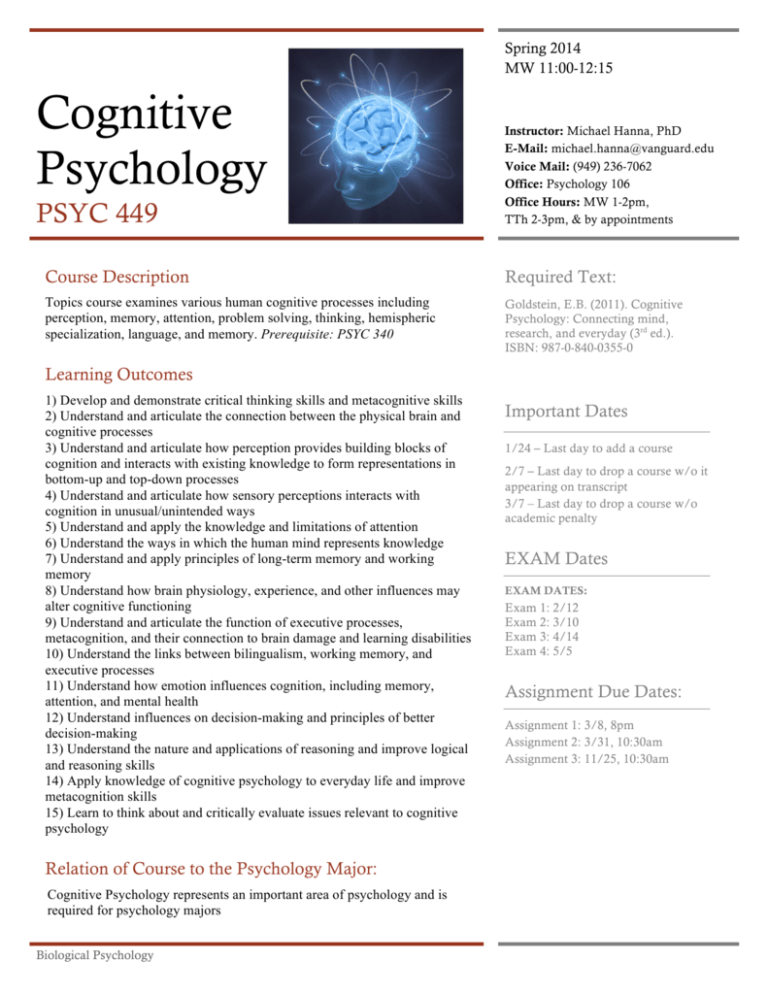
Spring 2014 MW 11:00-12:15 Cognitive Psychology PSYC 449 Instructor: Michael Hanna, PhD E-Mail: michael.hanna@vanguard.edu Voice Mail: (949) 236-7062 Office: Psychology 106 Office Hours: MW 1-2pm, TTh 2-3pm, & by appointments Course Description Required Text: Topics course examines various human cognitive processes including perception, memory, attention, problem solving, thinking, hemispheric specialization, language, and memory. Prerequisite: PSYC 340 Goldstein, E.B. (2011). Cognitive Psychology: Connecting mind, research, and everyday (3rd ed.). ISBN: 987-0-840-0355-0 Learning Outcomes 1) Develop and demonstrate critical thinking skills and metacognitive skills 2) Understand and articulate the connection between the physical brain and cognitive processes 3) Understand and articulate how perception provides building blocks of cognition and interacts with existing knowledge to form representations in bottom-up and top-down processes 4) Understand and articulate how sensory perceptions interacts with cognition in unusual/unintended ways 5) Understand and apply the knowledge and limitations of attention 6) Understand the ways in which the human mind represents knowledge 7) Understand and apply principles of long-term memory and working memory 8) Understand how brain physiology, experience, and other influences may alter cognitive functioning 9) Understand and articulate the function of executive processes, metacognition, and their connection to brain damage and learning disabilities 10) Understand the links between bilingualism, working memory, and executive processes 11) Understand how emotion influences cognition, including memory, attention, and mental health 12) Understand influences on decision-making and principles of better decision-making 13) Understand the nature and applications of reasoning and improve logical and reasoning skills 14) Apply knowledge of cognitive psychology to everyday life and improve metacognition skills 15) Learn to think about and critically evaluate issues relevant to cognitive psychology Relation of Course to the Psychology Major: Cognitive Psychology represents an important area of psychology and is required for psychology majors Biological Psychology Important Dates 1/24 – Last day to add a course 2/7 – Last day to drop a course w/o it appearing on transcript 3/7 – Last day to drop a course w/o academic penalty EXAM Dates EXAM DATES: Exam 1: 2/12 Exam 2: 3/10 Exam 3: 4/14 Exam 4: 5/5 Assignment Due Dates: Assignment 1: 3/8, 8pm Assignment 2: 3/31, 10:30am Assignment 3: 11/25, 10:30am RELATION OF COURSE TO INSTITUTIONAL TARGETS AND GOALS 1) Intellectual engagement: Students will learn core concepts and findings in cognitive psychology, and will think about and critically evaluate issues relevant to cognitive psychology and interpretations of cognitive psychology by the general public. 2) Spiritual formation: Students will consider the interconnection between cognitive processes and the spiritual life of individuals. 3) Professional excellence: Students will develop understanding of human nature from a cognitive perspective. Students will learn and further develop writing and research skills as relevant to cognitive psychology. 4) Sociocultural responsiveness: Students will explore the role of culture in shaping individual cognitive processes, and the role of individual level cognitive mechanisms in macro-level cultural processes, such as cognitive mechanisms of prejudice. 5) Responsible stewardship: Cognitive psychology will help students to acquire the body of knowledge regarding the role of cognition and emotion in personally and socially relevant decision making, and to exercise the skill of critical thinking useful for making decisions regarding personal, family, church, business, and societal matters. DISABILITY SERVICES: For students with documented medical or psychological disabilities, please contact the Coordinator of Disability Services to request accommodations. The Coordinator of Disability Services is located in the Counseling Center on the second floor of the Scott Academic Center and can be reached at extension 4489 or by email at disabilityservices@vanguard.edu For students with a documented learning disability who would like to request appropriate accommodations should contact Barbi Rouse, Director of Learning Skills, Scott Academic Center second floor, 714-619-6478, barbi.rouse@vanguard.edu CLASSROOM DIVERSITY STATEMENT As students and faculty at Vanguard University of Southern California, and foremost as Christian believers, we endeavor to communicate with honesty and confidentiality, to speak with encouraging and edifying words, and to create a safe environment where we shelter one another with love when vulnerabilities arise. This classroom intends to foster a Christ-centered community that promotes appreciation and respect for individuals, enhances the potential of its members, and values differences in gender, ethnicity, race, abilities, and generation. MOODLE: I will be using Moodle to post PowerPoint slides, study guides, handouts, and grades. Online quizzes and assignments will also be submitted through Moodle. You can access this course from your MyVU account. EVALUATION: Your grade is determined by the total number of points you have at the end of the semester, regardless of the points of other students. Your final course grade will be determined on the basis of four unit exams (100 points each), 15 CogLab assignments, (10 points each), 15 online quizzes three projects (10 points each), three assignments, as well as attendance and participation. Point totals will be posted throughout the term to enable you to track your. 1) Four Unit Exams (100 points each, 400 points total) The unit exams will cover text material, lectures, videos and other class material. Each exam will include 50 multiple choice questions (2 points per question). Makeup exams will only be granted in the event of extenuating circumstances (family emergency, hospitilazation). 2) CogLab (10 points each, 150 points total) There will be fifteen online CogLabs required for this course. CogLab is an online learning component created by the publisher of the textbook that helps to enliven the textbook content and illustrates how empirical research gives rise to new advances in cognitive psychology. Therefore, you will need a new version of the textbook that includes an online access code for CogLab. You will be required to complete the fifteen CogLabs online and submit their data to the class “group” data. The link for each CogLab will be posted on Moodle. The deadline for completing each CogLab is 10:30am on the due date (see syllabus for due dates). The link for accessing CogLab is https://coglab.cengage.com Biological Psychology 3) Online quizzes (10 points each, 150 points total) There will be fifteen online quizzes posted on Moodle. The quizzes will cover content relevant to that day’s CogLab as well as reading from the textbook. Each quiz is due by 10:30am on the due date (see syllabus for due dates). It is expected that students complete the online quizzes independently, without help from their classmates, as a matter of academic integrity and honesty. You may consult your textbook or class notes in the process of completing quizzes. 4) Attendance and Participation (145 points total) Attendance (95 pts) and participation (50 pts) are important to your learning in this class. Your on-time presence (within the first five minutes of class) for the full class period will result in 5 point being award for every lecture you attend, for a total of 150 points. 5) Assignments (105 points total) There will be three assignments for this class. The due dates for each are listed in the syllabus. Assignment 1: Generation of Multiple-Choice Questions for Exam 2 (25 pts) Assignment 2: Summary of Research Article (30 pts) Assignment 3: TED Talk Summary (50 pts) LATE POLICY: Any assignment, including online quizzes and CogLab, that is submitted after the deadline will be considered late and will be worth ½ credit. No credit will be given for work turned in more than 24 hrs past the due date. HOW TO CALCULATE YOUR GRADE: Exams (4x100): 400 points 15 CogLabs (15x10): 150 points 15 Online Quizzes (15x10): 150 points Assignments: 105 points Attendance (5 points per lecture): 95 points Participation: 50 points Total: 1000 points Biological Psychology Grade A AB+ B BC+ C CD+ D DF Score 930 –1000 pts 900 – 929 pts 870 – 899 pts 830 – 869 pts 800 – 829 pts 770 – 799 pts 730 – 769 pts 700 – 729 pts 670 – 699 pts 630 – 669 pts 600 – 629 pts 599 or lower Percentage 93%-100% 90%-92.9% 87%-89.9% 83%-86.9% 80%-82.9% 77%-79.9% 73%-76.9% 70%-72.9% 67%-69.9% 63%-66.9% 60%-62.9% < 59.9% TENTATIVE SCHEDULE Week Date Lecture Topic Reading 1/13 1/15 1/20 1/22 Course Overview Introduction to Cognitive Psychology NO CLASS: Martin Luther King Day Cognitive Neuroscience None Ch. 1 (pp. 2 – 21) 3 1/27 Cognitive Neuroscience Ch. 2 (pp. 36 – 45) 4 1/29 2/3 Perception Perception Ch. 3 (pp. 46 – 66) Ch. 3 (pp. 66 – 79) 5 2/5 2/10 Attention Attention Ch. 4 (pp. 80 - 98) Ch. 4 (pp. 98 - 113) 2/12 2/17 2/19 2/24 2/26 Exam 1 (Ch. 1-4) NO CLASS: President’s Day Short-term and Working Memory Short-term and Working Memory Long-term Memory: Structure Ch. 5 (pp. 114-130) Ch. 5 (pp. 130-145) Ch. 6 (pp. 146-157) 3/3 3/10 3/12 Long-term Memory: Encoding & Retrieval Long-term Memory: Encoding & Retrieval Exam 2 (Ch. 5-7) Everyday Memory and Memory Errors 3/17 3/19 3/24 3/26 NO CLASS: Spring Recess NO CLASS: Spring Recess Everyday Memory and Memory Errors Knowledge Ch. 8 (pp. 222-237) Ch. 9 (pp. 238-249) 3/31 Knowledge Ch. 9 (pp. 250-267) 4/2 Visual Imagery Ch. 10 (pp. 268-279) 4/7 4/9 4/14 4/16 Visual Imagery Language Exam 3 (Ch. 8-10) Language Ch. 10 (pp. 279-291) Ch. 11 (pp. 292-304) 4/21 4/23 4/28 Problem Solving Problem Solving Reasoning and Decision Making Ch. 12 (pp. 324-339) Ch. 12 (pp. 340-357) Ch. 13 (pp. 358-374) 4/30 Reasoning and Decision Making Ch. 13 (pp. 375-389) 5/5 EXAM 4, 10:30am-12:30pm (Ch. 11-13) 1 2 6 7 8 3/5 9 10 11 12 13 14 15 16 Biological Psychology Ch. 2 (pp. 22 – 36) Assignment CogLab and Quiz: Signal Detection Theory CogLab and Quiz: Brain Symmetry CogLab and Quiz: Muller-Lyer Illusion CogLab and Quiz: Stroop Effect CogLab and Quiz: Change Detection CogLab and Quiz: Memory Span CogLab and Quiz: Serial Position Ch. 7 (pp. 170-187) Ch. 7 (pp. 187-201) Ch. 8 (pp. 202-222) Ch. 11 (pp. 304-323) CogLab and Quiz: Encoding Specificity Assignment 1: Due 3/8 at 8pm CogLab and Quiz: Memory Judgment CogLab and Quiz: Absolute Identification Assignment 2: Research Summary CogLab and Quiz: Mental Rotation CogLab and Quiz: Link Word CogLab and Quiz Due: Lexical Decision TED paper due CogLab and Quiz: Typical Reasoning CogLab and Quiz: Decision Making

